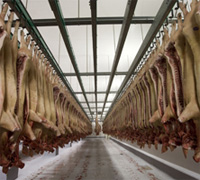US pork exports increase in volume with solid June results

If the trend established in the first six months of the year holds up, U.S. beef and pork exports are likely to set several new records in 2011 and each could eclipse the $5 billion mark for the first time ever.
Coming off a record value year in 2010 of more than $1.6 billion, pork exports to Japan have increased another 10 percent in volume (249,417 metric tons) and 13 percent in value ($944.2 million) through the first half of this year. Exports to Canada have grown at a similar pace – achieving a 10 percent increase in volume (97,204 metric tons) and 12 percent growth in value ($335 million). The Hong Kong/China region – where access was limited in the early months of 2010 – was up 42 percent in volume (173,462 metric tons) and 30 percent in value ($260.5 million).
“The situation in Korea stems from some unfortunate circumstances, as its hog herd has been devastated by foot-and-mouth disease,” Seng said. “But it makes for an interesting case study for the remarkable growth we can achieve when we are not saddled with a 25 percent tariff – something our members of Congress need to consider as they debate the Korea-U.S. Free Trade Agreement. In addition, we’ve seen the market share for U.S. pork increase versus our competition under comparable access conditions.”
As for Japan, Seng noted that this market continues to generate amazing returns for U.S. pork producers. He remains hopeful that by December the U.S. will be challenging last year’s record value – which is a mark many people would have said was unthinkable just a few years ago.
Mexico, the largest volume destination for U.S. pork, saw exports fall by 3 percent in volume (260,858 metric tons) and hold steady in value ($484.9 million) compared to last year. U.S. ham and shoulder cuts were recently granted a tariff reduction (from 5 percent to 2.5 percent) as a result of a settlement in the NAFTA trucking dispute. These retaliatory tariffs are scheduled to be removed completely in the near future, which should help U.S. pork regain momentum in Mexico.
“Our pork results in Mexico are still solid, but I will be very pleased when these retaliatory tariffs are completely behind us,” Seng explained. “Canada is our chief competitor in this market, and these tariffs severely reduced our advantage in terms of transportation costs.”











